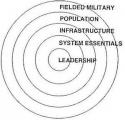The United Nations charter prohibits the use of force in the settlement of disputes between nations, with two exceptions. Force is legally permissible when the United Nations Security Council has authorized it through a mandatory resolution under Chapter VII of the Charter. Force is also legally permissible in "self defense." The UN Charter does not define self defense so international lawyers turn to customary international law, which has produced a substantial body of writing on the subject.
Self defense between nations as a legal concept arose during the 19th century (Daniel Webster was instrumental in the creation of the doctrine). The Caroline incident makes for a fascinating story in itself, but I'll skip the burning steamship going over Niagra falls and get straight to the boring legalities, which boil down to necessity and proportionality:
1) The use of force must be necessary to remove the threat. That means that lesser options like warnings, etc. must be insufficient.
2) The use of force must be proportional to the threat. If a half dozen commandos sneak across the border you can chase them down with forces of your own, but you can't nuke the opposition.
There have been refinements and accretions over the years. Many decades ago, it was determined that the use of force in reprisals is illegal. The US invasion of Afghanistan was conducted on self defense grounds, even though the government of Afghanistan itself was arguably innocent of involvement in the various September 11 attacks. The rescue of hostages held in a foreign country is generally legal, as is the evacuation of foreign noncombatants from a war zone. It's also permissible to help another country defend itself, even if the helping country hasn't been attacked (this is known as collective self defense). Finally, force is legal if a host country grants permission.
Israel's response to attacks on its territory by Hamas and Hezbollah present a difficult case study. I'll start with Gaza (and ignore questions of Palestinian sovereignty, treating Gaza as part of a bona fide nation state because that's by far the majority position).
Taken in isolation, the kidnapping and murder of a handful of soldiers is indeed sufficient to merit a forceable response in self defense. Certainly a commando raid to try to rescue their trapped soldier would be allowed. So would an attack on any identifiable Hamas units that might be poised to launch another such sneak attack. However, a large scale offensive (as has been conducted) seems quite out of proportion to the level of threat involved. But of course, Hamas hasn't limited themselves to simply that one operation - they've launched a large number of rockets at civilian targets. Given that ongoing and continuous pattern of attacks, Israel would be justified in a much higher level of force. Pretty much any sort of search and destroy operation to take down the rocket teams themselves is allowed. Likewise, trying to cut supply lines to the teams. None of this deals with the requirements of the Laws of Land Warfare to mitigate harm to civilians, of course.
Israel's seizure of high level Hamas leaders, however, does not appear to be necessary to achieve the cessation of rocket attacks or the rescue of their soldier. Likewise, attacks on power stations, water supplies and so forth have no place in national self defense of this sort.
Lebannon is a different case study. Air strikes against bridges and airports may be necessary (tactically and therefore legally) to prevent the movement of their soldiers from beyond help of rescue. However, these attacks are NOT proportional to the harm inflicted by Israel's air attacks. Israel would do better to make efforts to mitigate the civilian losses caused by these measures - for example psychological operations to convince civilians to evacuate the affected area. Attacking non-Hezbollah targets in Lebannon would be legitimate under the same rationale as attacking Taliban targets to get at al Qaeda in Afghanistan.
In a real sense, this is a completely academic discussion. You can't be put in "international jail" and no one can compel Israel to defend its actions in court. However, that doesn't mean that international law is without important consequences! Other nations shape their reactions based on the conduct of the nations that are parties to a conflict. Europe, especially, is sensitive to concerns of international law. Various middle eastern nations with a stake in seeing Israel suffer can use this "violation" as a propaganda tool and to justify sending assistance to their side. Of course, Israel may have concluded that Europe and the Middle East will view any armed response by Israel as immoral, vicious and wrong (not far from my assessment, actually), and also that Europe and the Middle East will not do a damned thing in response to violations by Hamas, Hezbollah, Lebannon, Syria or Iran (completely true).
So, to sum up:
1) State sponsors of terrorism are legitimate targets, with or without UN approval.
2) Nevertheless, military operations must be necessary (to stop the threat) and proportional (to the threat).
3) Not all of Israel's operations have met this dual standard. However, the ramifications of those violations are (in this instance) minor at best.
4) The U.S. would be justified in sending our forces to Mexico to rescue 40 hostages - or 1 hostage. However, we'd have to be quite careful in how much damage we inflicted along the way.
5) As for the U.S. as a state sponsor of Israel, no doubt it looks that way. However, Israel's actions are acts of war rather than terrorism. I can't give you a precise definition explaining why because no one has a precise definition of terrorism.
6) Nevertheless, terrorist organizations will use these latest attacks to recruit individuals to attack Americans and America based on our "sponsorship."










Bookmarks